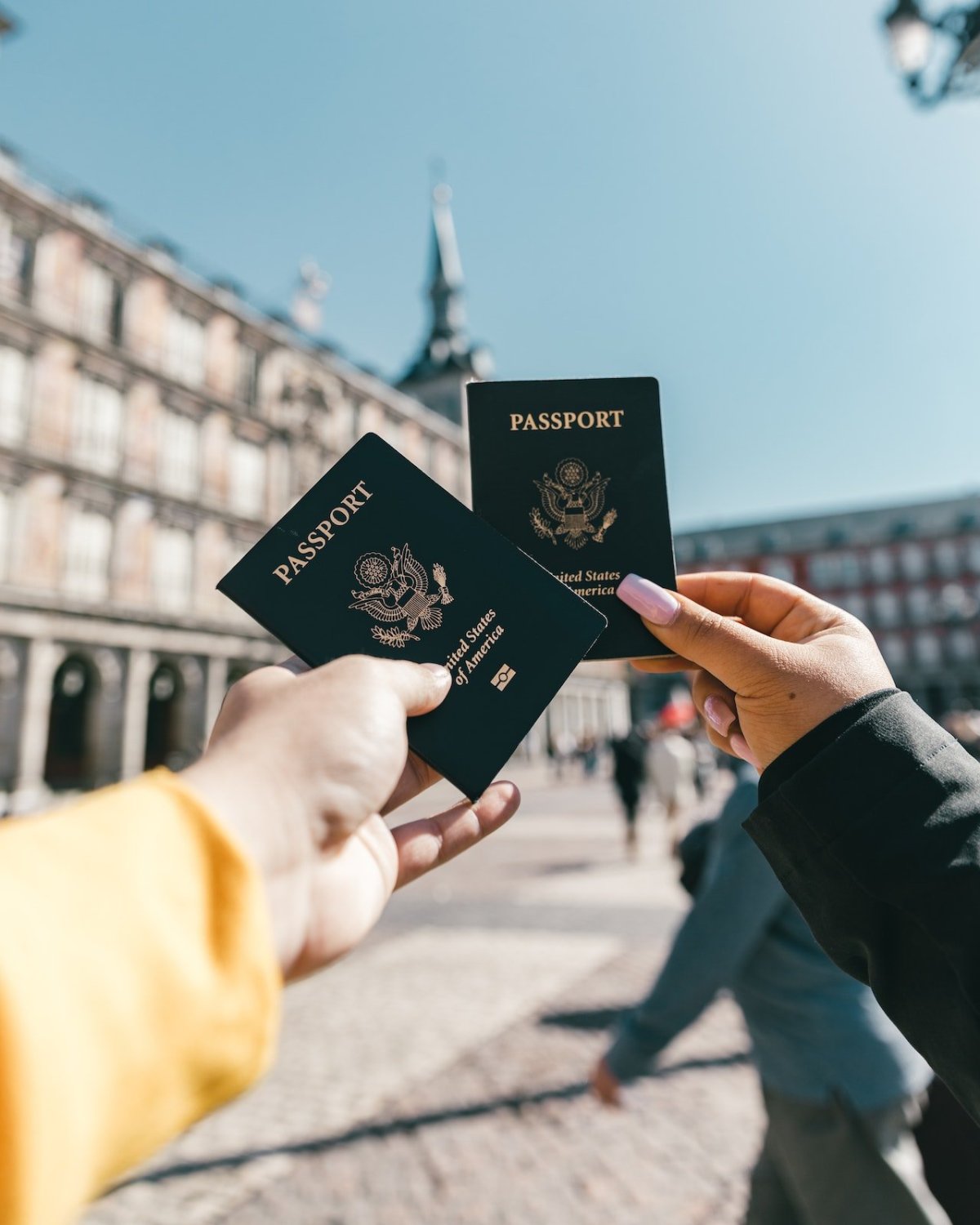Your vacation is scheduled for this summer and you dream of going on a trip abroad? But you are not yet used to traveling far and you are wondering how to organize this trip? What should you definitely not forget? When it is the first time you travel, you are always afraid of forgetting an important detail to have a peaceful vacation. That is why today, I am sharing with you 15 tips for traveling abroad this summer. I hope this will help you prepare for your trip and leave without stress!
1. Want to pack your bags?

Before leaving, you are probably already dreaming of packing your bags! So, let’s talk about your luggage! We don’t think about it much, but it will have a considerable impact on the organization of your stay. Indeed, you will be able to choose whether or not to have checked baggage, if you are leaving by plane. This will change your organization, but also your travel budget.
In addition, the size of this luggage will also be important, especially if you are traveling by motorbike, bicycle or road trip. This is therefore an element to take into account even before booking your flight. You will need to study the price of a cabin bag, a checked bag, the authorized weight and put all this into perspective with the number of stages in your travel itinerary and the total duration of your stay. For example, it will not be very practical to take 2 suitcases with you if you change hotels every day!
2. Where to go abroad this summer?
If you are here, it is because you want to go outside our borders this summer! Yes, but where? Are you still hesitating?
The world is full of beautiful places to discover. And luckily, there are dozens of destinations around the world where you can go in July or August to enjoy ideal weather.
In Europe , all destinations are pleasant! You can bet on Iceland, the Azores or Norway to feel like you’re in a different world. For a relaxing beach holiday, head to Greece, Croatia or even Spain.
Outside of Europe, it is possible to enjoy a favorable climate in America, with the USA and Canada in particular reaching out to you.
On the other hand, in Central and South America, it is the wet season or winter. So it is not the best time to go to Mexico or Argentina. Although some regions of Brazil are accessible.
Finally, in Asia, it is also the wet season in July and August. You should avoid Thailand and the Philippines. On the other hand, some regions of Sri Lanka and more generally Bali have favorable climates. It is also a good time to travel to Japan.
On the Oceania side, it is winter in Australia and New Zealand. You can go there only if you do not fear the cold. On the other hand, it is the ideal season to discover French Polynesia!
Are you dreaming of traveling to Africa? Be aware that summer is a bit of a hot time to go to Dubai, Egypt or Morocco. On the other hand, it is a good time to stay in Mauritius, Reunion Island or Namibia.
The question may not arise and the means that comes to mind is probably the plane! However, the price of plane tickets may increase enormously as summer approaches. So, I advise you to use a flight comparator to prepare your trip. You will also have to be flexible. Indeed, one or two days later, you can get great discounts on the price of your flight.
In addition, you could choose to go by train or bus for a smaller budget, but also by motorbike, van or even bicycle . Yes, traveling by bike is the opportunity to live a great experience that is both sporty and ecological!
4. Check the administrative formalities

You have chosen your destination and the duration of your stay? Perfect! Now it’s time to check the entry formalities. Here are some questions to ask yourself before you leave:
- Do you need a passport? If yes and you do not have one, take the necessary steps as soon as possible, because the waiting time to obtain one is long (it often takes 6 weeks or more).
- Is a visa required? Find out about this before your stay on the “France Diplomatie” website. Similarly, if you are making a stopover to reach your destination, you will need to ask yourself whether a visa is required in the country even in the event of a stopover. This is particularly the case in Canada and the USA.
- Vaccinations: Are there any specific vaccinations required to travel to this destination? For example, for a trip to Brazil, the yellow fever vaccine is strongly recommended.
- Covid: Is a PCR test or proof of vaccination required in the country you are traveling to? For vaccinated people, all borders are open without restrictions except China (where a PCR test is required). For unvaccinated people, some countries in Africa, Asia and Bolivia still require an antigen or PCR test.
5. Learn more about the rules of conduct
Are you planning to take a road trip during your stay or simply explore the surroundings of your destination by car? To do this, you will need to know whether you need to obtain an international driving license before renting a vehicle in the country you are traveling to.
In addition, you will also need to have information about road conditions, driving habits and rules. Did you know that you must always have your lights on when driving in Iceland? You may dream of renting a car in the Dominican Republic, but you will probably change your mind after meeting other drivers there…
All this information will be something to look for before you leave!
6. Determine a travel budget

Everyone has their own way of traveling! You can volunteer, stay in an Airbnb with a local or in a hostel. You can also book a suite in an all-inclusive luxury hotel. So the question to ask yourself is: What are your travel habits? And what are your desires?
Your budget will vary greatly from one option to another. And besides, accommodation is not the only expense to consider.
- Are you going to eat out or go shopping?
- Will you participate in free or paid activities?
- Are you going to travel by bus or taxi?
To define your travel budget, look at the price of some accommodations during the period of your stay, but also the price of car rental, restaurants and activities. This will give you a good idea of the amount to plan for.
Also know that when traveling, we often spend more than we had set! So, leave yourself a little margin in the defined budget!
7. Travel insurance: useful or not?
To leave with more peace of mind, you can take out travel insurance before your departure. It can reimburse you in the event of cancellation, but also in the event of health problems on site. This type of insurance is particularly useful if you are traveling with children or in countries where health care is very expensive (such as the United States, but not only). On the other hand, in Europe, you can request (free of charge) your European Health Insurance Card in order to be covered.
8. Consider bank fees

Banks may charge you fees if you make payments or withdrawals abroad. However, sometimes, some local banks are partners with yours and allow you to reduce these costs. So check with your bank before you leave. You can also check the limits of your credit card . When traveling, you can sometimes have large expenses (especially for the deposit of a car rental for example) and you will sometimes have to increase your payment limit.
9. The question of electrical outlets
As you know, sockets are not the same everywhere. You will therefore need to check the type of socket that is located at your destination. This will allow you to know if you need an adapter and to anticipate!
10. What about your cell phone?
Depending on your destination, your operator may not cover you abroad (especially outside Europe). To avoid additional charges, you will therefore have to prohibit data abroad and communicate instead by Whats App or Messenger using wifi. It is also possible to buy a local SIM card for the duration of your stay to be able to make calls more easily. Some operators, like Free, cover you for free in dozens of destinations. Check with your operator before you leave!
11. Withdraw money
Many European countries do not use the Euro. This is particularly the case for Croatia, Hungary, Denmark and Norway. So, if you are going to these countries or even further afield during your holidays, it is best to have some notes of the local currency on you, in order to be able to pay for a taxi or a bus ticket. It is not advisable to withdraw a large sum of money since credit cards are accepted almost everywhere now. You can change 50 or 100 euros to avoid having to think about it during your first hours there.
12. Book your accommodation
If you are traveling abroad in the summer, it is often the peak tourist season . Therefore, I advise you to book your accommodation before you leave! Indeed, the rates are often more expensive on the day itself. In addition, you risk finding yourself faced with a full hotel after a busy day ! Booking your accommodation in advance certainly offers you less flexibility, but will save you a lot of stress.
13. Make a travel plan

If you want to go abroad this summer without stress, I advise you to plan your travel itinerary before you leave.
For example, if you are planning a road trip, imagine each stage of your journey day by day. You can use Google Maps to help you calculate your route. Know that it is best to drive at the end of the day to be ready and enjoy your activities as soon as you wake up. Pay attention to any roads that may be closed at this time, highway tolls, and the distance between two stages.
Moreover, even if you are visiting a city, you can plan your days based on the neighborhoods to discover and the places to visit.
By the way, if you have ideas for activities to do on site, don’t hesitate to book them before you leave. This will allow you to avoid queuing on the day and to be sure to have places if they are popular places (like the Louvre in Paris or the Alhambra in Granada). Sites like Get Your Guide are very reliable and will allow you to book easily. However, I do not advise you to book everything down to the hour. Depending on the weather and your desire for the day, your program may change! That’s also part of the vacation!
14. Keep your documents safe
Before you leave, it is advisable to scan your personal documents and plane tickets. Send them to yourself by email to make sure you have them with you in case of a problem.
A few days before your departure, check your reservations, your papers and pack your bags one last time . Don’t forget:
- your identity documents
- your phone and charger
- your credit card
- your medications and prescriptions
- your child’s comfort blanket.
Everything else is not really essential and you can probably buy it back there if needed.
15. Find out about current events in the country
Finally, before you leave, it may be useful to find out about the latest news in the destination where you are staying : are there regions to avoid and things to know (political tensions, climatic dangers, security, dress codes, etc.). Browse blogs and forums on the subject in order to leave even more prepared and serene!
You now have all the essential information to go abroad this summer while being well prepared. If you have other advice in mind to give to travelers before their departure, do not hesitate to leave us a comment. So, where are you going this summer?


